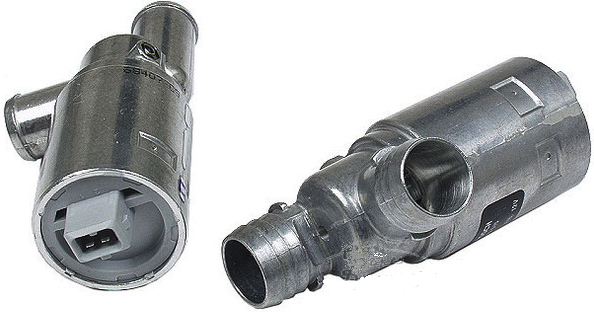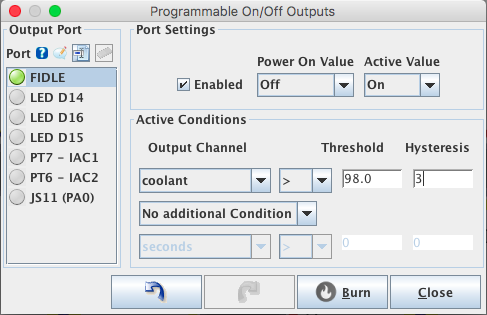PWM F-idle valve
With a cold engine the crankshaft experiences more resistance. As a result, the engine will run at slower idle speed. We would prefer the engine to idle a little faster so that it stalls less quickly.
To arrange this, we need a idle bypass air valve. This allows some extra air to run into the engine around the throttle valve. As a result, the idle speed will increase and be adjustable.
These are available in 2 versions of this valve:
PulsWidth Modulation idle Valve (PWM F-idle valve)
- 2 wires
- 3 wires
The 2-wire valve contains a spring to return to the closed position. The 3-wire valve does this with an electromagnetism (a coil).

To connect
Connecting the PWM-Fidle valve is very easy.
2 wires
The 2-wire valve contains a coil to open the valve and a spring to close it. The 2-wire valve receives a plus from the fuse box on 1 of the 2 pins. The other pin goes to PWM F-idle connection on the EFIgnition. Note: some valves (eg Ford) contain an extinguishing diode. Wrong connection causes a short circuit!
3 wires
The 3-wire valve does not contain a spring but 2 coils. The middle pin is the 12 volt connection. The 2 other pins open or close the valve. In general, a 3-thread valve runs more smoothly. The first 2 connections are the same as the 2-wire valve. A wire with a minimum resistance of 25 watts and 20 ohms will be connected to the 3rd connection. It then closes the valve with a small current while the ECU opens the valve with a current controlled by the microprocessor.
Freely programmable
If this output is not used for a PWM F-idle valve, then this output can be used universally. The wire can become a ground contact when the function becomes active. For example, a relay for a radiator fan can be connected, a solonoid boost, a camshaft adjuster or whatever you can imagine.

An example programming for a radiator cooling motor connected to the Fidle output if it is not used by a PWM Fidle valve

